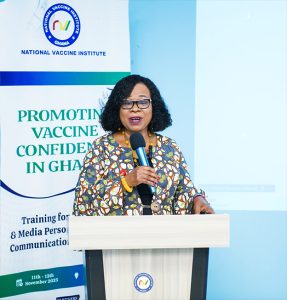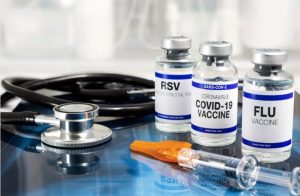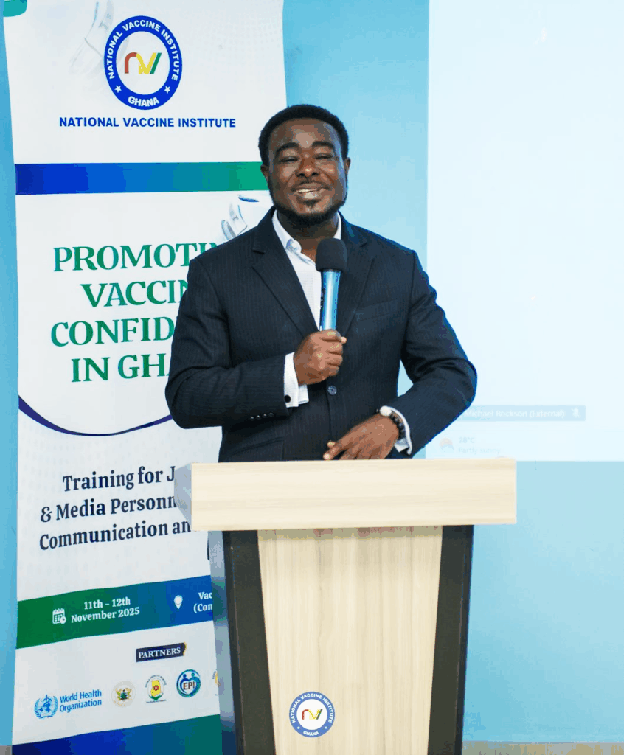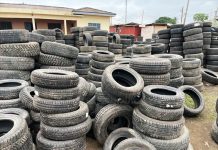Ghana is taking deliberate steps toward becoming a vaccine-manufacturing country, a move experts believe will strengthen national health security, accelerate economic development and reduce Africa’s long-standing dependency on external suppliers during pandemics.
This development formed the core of discussions at a two-day training on vaccine communication and advocacy held at the National Vaccine Institute (NVI) in Accra.
The event, organised in partnership with the African Media and Malaria Research Network (AMMREN), Ghana Health Service, Noguchi Memorial Institute for Medical Research and the Food and Drugs Authority (FDA) brought together journalists from across the country to deepen their understanding of vaccine science, counter misinformation and support Ghana’s vaccine self-sufficiency agenda.
Building Local Manufacturing Capacity for National Resilience
The CEO of the National Vaccine Institute, Dr. Sodzi Sodzi-Tettey, said Ghana’s decision to venture into vaccine manufacturing is not only a public health milestone, but also a strategic development investment.
He explained that Africa’s inability to secure vaccines during COVID-19 and Mpox outbreaks exposed structural vulnerabilities on the continent and reinforced the urgent need for domestic production capacity.
Ghana is receiving advanced technical support through a technology-transfer partnership between Atlantic Life Sciences and Indonesia’s BT Biofarma.
This collaboration will allow the country to establish its own production systems while adopting globally recognised standards for quality, safety and regulatory oversight.
The first vaccine to be produced locally will target tetanus bacteria, with rollout expected in late 2026 or early 2027.
Dr. Sodzi-Tettey emphasised that the initiative aligns with President John Mahama’s long-term vision for Ghana to lead West Africa in vaccine development and pandemic preparedness.
“This is a development investment. We are building an ecosystem manufacturing capacity, regulatory systems, scientific research, community engagement, and skilled human resources,” he said.
He described vaccine manufacturing as a catalyst for job creation, biotechnology innovation, and industrial transformation, noting that the sector could spur growth in pharmaceutical engineering, cold-chain logistics, laboratory technology, and advanced research.
Dr. Sodzi-Tettey stressed that misinformation poses one of the greatest risks to Ghana’s vaccine agenda and, by extension, national development.
He recalled how rumours once undermined a vaccine trial in the Volta Region and how COVID-19 conspiracy theories spread even among educated groups.
He said trust is a “development resource” and warned that without it even the best infrastructure and technology could fail.
“If journalists are not well informed, misinformation can collapse the entire effort. Vaccine confidence is foundational to Ghana’s manufacturing ambitions,” he stated.
To address this, the NVI and its partners plan nationwide community engagements to understand public concerns, promote transparency, and prepare communities ahead of the release of Ghana’s first domestically produced vaccines.
Strengthening Human Capital Through Science Communication
Executive Secretary of AMMREN, Dr. Charity Binka, said that strengthening journalists’ capacity was equally a national development strategy.

She explained that a scientifically literate media contributes to a healthier population, better policy uptake, and stronger community cooperation during health interventions.
She described journalists as “critical development actors” who translate complex research into accessible information that informs decision-making at household, community, and national levels. Since 2006, AMMREN has trained hundreds of journalists across Africa to report accurately on malaria, epidemics, and vaccines.
Their partnership with the NVI, she noted, extends this mandate into Ghana’s vaccine-manufacturing era.
Dr. Binka added that vaccines have played a transformative role in reducing disease burden, improving productivity, and enabling children to attend school, which is a direct contribution to Ghana’s social and economic development indicators.
She said the training programme was designed to help journalists understand vaccine science, navigate the ethics of health communication, counter misinformation, and tell development-oriented stories that build national resilience.
“A well-informed journalist supports a well-informed population. And a well-informed population is the backbone of national development,” she said.
Dr. Tanko Schools Media on Vaccine Science
Dr. (Med) Naziru Tanko Mohammed, Deputy Programme Manager for the Expanded Programme on Immunization (EPI) at the Ghana Health Service, reaffirmed the life-saving power of vaccines, describing them as “one of the greatest health breakthroughs in human history.”

He explained that vaccines stimulate the body’s immune system to develop long-lasting protection against specific pathogens.
“Vaccines contain the same antigens found in disease-causing germs, but exposure through vaccination is controlled,” he noted, adding that this controlled exposure teaches the immune system to recognise and respond to real infections without the person falling ill.
Dr.Tanko stated that vaccines used in Ghana’s national immunisation programme generally fall into two categories: Live Attenuated and Inactivated vaccines. Inactivated vaccines include killed, sub-unit, toxoid, viral vector and mRNA types.
While live attenuated vaccines contain weakened germs that cannot ordinarily cause disease. Inactivated vaccines are made from killed germs, specific components, or toxins.
Two or more vaccines can be combined to form multivalent formulations such as Pentavalent, Measles-Rubella (MR), and Tetanus-Diphtheria (Td).
He also highlighted modern vaccine technologies, including mRNA-based vaccines such as Moderna and Pfizer’s COVID-19 vaccines.
Touching on immunity, Dr.Tanko explained that it could be acquired through natural infection or vaccination. Vaccination “primes” the immune system so that when a vaccinated individual is later exposed to live pathogens, their immune system can quickly destroy them before disease develops. He emphasised that vaccines used in Ghana’s national programme are safe and effective.
Although no vaccine is completely free of minor side reactions, the very low risk of adverse events is far outweighed by the dangers posed by natural infections such as measles.
FDA Outlines Ghana’s Vaccine Regulatory Standards
Representing the CEO of the Food and Drugs Authority (FDA), Pharm. Patrick Owusu-Danso, Acting Director at GLSR-FDA, explained the rigorous process that vaccines undergo before approval and distribution in Ghana.
He said the FDA evaluates vaccines across several key areas: safety, identity, efficacy, purity, and quality.
Safety is ensured through detailed animal studies and clinical trials, while identity is confirmed by verifying that labelling accurately reflects active ingredients and excipients.
Efficacy is demonstrated through challenge studies and human clinical trials, purity is maintained by controlling impurities within acceptable limits and quality is guaranteed through adherence to Good Manufacturing Practices (GMP) and robust Quality Management Systems.
Pharm. Owusu-Danso added that the FDA oversees the entire vaccine supply chain, including shipping validation studies, cold-chain monitoring and enforcement of Good Distribution Practices.
He emphasised that Ghana operates under a robust and stringent regulatory environment designed to protect public health.
“FDA Ghana is a strong regulatory authority in Africa with the legal mandate and technical capacity to assure the safety, efficacy, and quality of vaccines,” he said.
Towards a Stronger, Safer and More Self-Reliant Ghana
The Accra training underscored the shared belief among NVI, AMMREN, FDA, GHS, and Noguchi that vaccine manufacturing is not simply a health-sector achievement – it is a national development strategy capable of reshaping Ghana’s scientific, economic and industrial future.
As Ghana moves closer to its first vaccine manufacturing milestone in 2026, stakeholders say public trust, media accuracy and community engagement will be just as crucial as technology and infrastructure.
Through this collaborative approach, Ghana aims to build a future where the country is not the last to receive vaccines during global crises, but becomes a regional leader in biotechnology, innovation, and health sovereignty.
For more news, join The Chronicle Newspaper channel on WhatsApp: https://whatsapp.com/channel/0029VbBSs55E50UqNPvSOm2z









